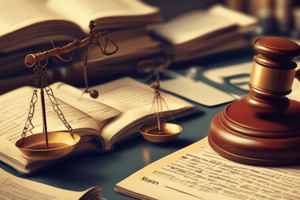Podcast
Questions and Answers
What is the primary purpose of the trial phase of criminal proceedings?
What is the primary purpose of the trial phase of criminal proceedings?
- To determine the sentence for the accused
- To determine the criminal liability of the accused (correct)
- To prove the innocence of the accused
- To impose punishment on the accused
What happens if the accused is acquitted during the trial phase?
What happens if the accused is acquitted during the trial phase?
- The accused is found guilty
- The accused is released and the proceedings continue
- The accused is released and the proceedings come to an end (correct)
- The accused is sentenced to punishment
What is required for the court to find an accused guilty?
What is required for the court to find an accused guilty?
- A plea of guilty from the accused
- Proof of innocence beyond a reasonable doubt
- A confession from the accused
- Proof of guilt beyond a reasonable doubt (correct)
What determines when the sentencing stage of criminal proceedings occurs?
What determines when the sentencing stage of criminal proceedings occurs?
What is the role of the presiding judicial officer during the sentencing stage?
What is the role of the presiding judicial officer during the sentencing stage?
What is the purpose of the sentencing stage?
What is the purpose of the sentencing stage?
What is the sentencing process compared to?
What is the sentencing process compared to?
What is the relationship between the terms ‘sentence’ and ‘punishment’?
What is the relationship between the terms ‘sentence’ and ‘punishment’?
What is the ultimate outcome of the trial phase of criminal proceedings?
What is the ultimate outcome of the trial phase of criminal proceedings?
Upon what condition must the prosecution prove the accused's guilt?
Upon what condition must the prosecution prove the accused's guilt?
What is the primary consideration for the presiding judicial officer during the sentencing stage?
What is the primary consideration for the presiding judicial officer during the sentencing stage?
What is the nature of the sentencing process in criminal proceedings?
What is the nature of the sentencing process in criminal proceedings?
What is the relationship between the terms 'sentence' and 'punishment' in the context of criminal proceedings?
What is the relationship between the terms 'sentence' and 'punishment' in the context of criminal proceedings?
What is the purpose of the trial on merits stage?
What is the purpose of the trial on merits stage?
What is the significance of the prosecution's burden of proof in criminal proceedings?
What is the significance of the prosecution's burden of proof in criminal proceedings?
What is the ultimate goal of the sentencing stage in criminal proceedings?
What is the ultimate goal of the sentencing stage in criminal proceedings?
Flashcards are hidden until you start studying
Study Notes
Trial Phase of Criminal Proceedings
- The trial phase determines the criminal liability of the accused for the alleged crime, culminating in the court's verdict (judgment)
- If acquitted, the accused is released, and the proceedings come to an end
Burden of Proof
- To find an accused guilty, the court must be satisfied that the prosecution has proven the legal guilt beyond reasonable doubt
- The court must be convinced of the accused's guilt after mature consideration
Sentencing Stage
- The sentencing stage only operates if the accused is convicted during the trial on merits stage or a plea of guilty is recorded
- The sentencing stage determines the punishment (sentence) to be imposed on the convicted person
Role of Presiding Judicial Officer
- The presiding judicial officer plays an active inquisitorial role in determining sentence
- The officer must control the proceedings according to recognized rules of common law, statutory law, and constitutional requirements
- The officer must ensure justice is properly and appropriately served
Sentencing Process
- The sentencing process is a separate 'mini-trial' or factual inquiry
- It may take place immediately after conviction or weeks/months later, depending on the information available
- The terms "sentence" and "punishment" are used interchangeably
- "Punishment" generally refers to the imposition of a sentence resulting in an unpleasant experience for the convicted person
- Not all sentences constitute punishment (e.g., a caution)
Trial Phase of Criminal Proceedings
- The trial phase determines the criminal liability of the accused for the alleged crime, culminating in the court's verdict (judgment)
- If acquitted, the accused is released, and the proceedings come to an end
Burden of Proof
- To find an accused guilty, the court must be satisfied that the prosecution has proven the legal guilt beyond reasonable doubt
- The court must be convinced of the accused's guilt after mature consideration
Sentencing Stage
- The sentencing stage only operates if the accused is convicted during the trial on merits stage or a plea of guilty is recorded
- The sentencing stage determines the punishment (sentence) to be imposed on the convicted person
Role of Presiding Judicial Officer
- The presiding judicial officer plays an active inquisitorial role in determining sentence
- The officer must control the proceedings according to recognized rules of common law, statutory law, and constitutional requirements
- The officer must ensure justice is properly and appropriately served
Sentencing Process
- The sentencing process is a separate 'mini-trial' or factual inquiry
- It may take place immediately after conviction or weeks/months later, depending on the information available
- The terms "sentence" and "punishment" are used interchangeably
- "Punishment" generally refers to the imposition of a sentence resulting in an unpleasant experience for the convicted person
- Not all sentences constitute punishment (e.g., a caution)
Studying That Suits You
Use AI to generate personalized quizzes and flashcards to suit your learning preferences.





